Immutable Definition

What Is Immutability?
Immutability refers to the property of blockchain records that, once confirmed by the network, are extremely difficult to alter or delete. This ensures that transactions, contract states, and asset ownership are preserved as a publicly accessible, long-term “ledger of record.”
Think of a blockchain as a ledger maintained by multiple parties: each page is stamped with a unique “seal,” and everyone on the network holds a copy. If someone tries to tear out or change a page, they would need almost all participants to agree to the modification—a virtually impossible task in practice.
Why Does Blockchain Immutability Matter?
Immutability is crucial because it provides a “verifiable history” for value transfer and collaboration. Without a trustworthy history, it becomes nearly impossible to determine who owns what or who did what on the internet.
On the asset level, immutability prevents double-spending of tokens. For businesses, it enables reliable auditing, compliance, and evidence collection; for example, companies can use on-chain timestamps to prove when materials were submitted. On a personal level, users can independently verify their deposits or NFT ownership without fully relying on a single platform’s database.
How Does Blockchain Immutability Work?
The technical foundation of immutability lies in two core mechanisms: hash links between blocks and distributed consensus.
A hash functions like a data “fingerprint.” Each block contains the hash of the previous block, chaining them together. If anyone tampers with past data, the fingerprint changes, exposing any attempt at manipulation.
Distributed consensus is akin to “multi-party voting for bookkeeping.” To alter blockchain history, one would have to control the majority of voting power (either computational or staked), which requires immense resources. Even if a minority of nodes attempts to rewrite records, others will reject inconsistent ledgers.
How Is Immutability Reflected in Smart Contracts?
Smart contract immutability is manifested in how code and state are recorded. Once deployed, a contract’s code hash and address are fixed—effectively sealing the program in an immutable state.
Each time a contract’s state (such as balances or configurations) changes, a new record is created while old records remain accessible and traceable. Event logs serve as detailed “operation statements,” enabling external systems and auditors to track contract activity.
It’s important to note that many projects use “proxy contracts” for upgrades. A proxy contract works like keeping the same “address” while swapping out the internal “equipment”—users always interact with the same address, but the underlying logic can be updated. All upgrade actions are transparently recorded on-chain.
What Are the Limits of Public Blockchain Immutability?
Immutability is not absolute; it is bounded by finality and governance rules. Finality can be thought of as the “setting time” of cement: transactions can be reworked right after being submitted, but become irreversible once finalized.
As of December 2025, mainstream networks achieve finality at different paces (based on Ethereum.org documentation and client metrics, Bitcoin.org references): Ethereum achieves minute-level finality under Proof of Stake, with most blocks widely accepted within minutes. The Bitcoin community generally considers “6 confirmations” (about an hour) as sufficiently secure. Occasional “reorgs” are like “undoing the last page,” but usually happen within a short window.
On the governance layer, hard forks act as “splitting into two ledgers”: rule changes by the community create a new chain while the original history remains intact. Historic events like the 2016 DAO fork show that in extreme cases, communities can use governance to alter the timeline—but all changes are transparent and traceable.
How Can You Verify Transaction and Data Immutability?
To verify immutability, you can directly examine original blockchain records. The most practical way is to use a block explorer to check transaction and block data.
Step 1: Obtain the transaction hash. This hash acts as the transaction’s unique “fingerprint.” When depositing or withdrawing via Gate, you’ll usually receive this transaction hash.
Step 2: Search for it on a block explorer. Paste the hash into an Ethereum or Bitcoin explorer to view block height, confirmation count, sender and receiver addresses, amount, and timestamp.
Step 3: Assess finality and immutability. Once confirmations reach community-recommended thresholds (e.g., 6 confirmations for Bitcoin, several minutes for Ethereum with broad node acceptance), the record is permanently preserved across all network copies—making modifications extremely costly and difficult.
For team collaboration and auditing, saving both transaction hashes and block heights provides an independently verifiable evidence chain.
How Do Upgrades and Governance Balance Immutability?
Balancing immutability with upgrades hinges on making all changes transparent and traceable—while minimizing disruption to existing records.
At the contract level, upgrades commonly use proxy contracts: addresses remain constant while logic is redirected to new code. All upgrade proposals and actions are logged on-chain for community review.
At the protocol level, changes to network parameters and rules go through governance procedures—proposal submission, discussion, voting, and implementation. Every phase leaves a public audit trail, ensuring that “why” and “how” changes occur is always clear and verifiable rather than hidden.
Where Is Immutability Valuable in Web3 Applications?
Immutability is crucial in many scenarios. In NFTs, it secures provenance and transfer history—allowing collectors to trace origins and verify rarity.
In DeFi, immutable transaction and event logs facilitate audit trails and risk management by recording strategy execution. In supply chain and certification use cases, companies can timestamp key milestones and summaries on-chain to create an auditable evidence chain.
For developers, immutability enables “version rollback”: when issues occur, it’s possible to pinpoint exactly when, where, and why changes happened.
What Risks Does Immutability Introduce—and How Can They Be Managed?
Immutability means that mistakes—such as misdirected funds, contract bugs, or data leaks—are permanently recorded on-chain and cannot be erased.
Mitigation strategies include:
- Pre-deployment audits and thorough testing to reduce code risks;
- Use of multi-signature wallets and time locks to minimize operational errors and single points of failure;
- Layered storage—store only data hashes on-chain while keeping sensitive information off-chain or in decentralized storage with access controls;
- Full understanding of upgrade and governance pathways so that necessary fixes can be implemented transparently if needed.
For fund security: always double-check addresses and networks, test with small amounts first, securely manage private keys and seed phrases, and verify network/tag settings on platforms like Gate to avoid irreversible losses.
Immutability: Summary & Learning Path
Immutability forms the foundation of trustworthy blockchain history: hash linking and distributed consensus make altering past records extremely difficult, while finality and governance define boundaries for when changes are possible. Understanding both its value and limitations is essential for effective upgrades, auditing, and compliance.
Recommended learning path: First master hashes and block linking; then move on to consensus mechanisms and finality; next study smart contract states and proxy upgrade patterns; finally, apply these concepts by using block explorers to verify transaction hashes from Gate—turning theory into hands-on practice.
FAQ
Does Immutability Mean I Can Never Reverse a Mistaken Transaction?
Immutability does mean that blockchain transactions cannot be altered or deleted—but that does not mean recovery is impossible. If you send assets in error, you can send a new transaction to return them or negotiate with the recipient for a refund. The key distinction: immutability protects historical accuracy—not transactional reversibility. Choosing platforms with emergency mechanisms (such as Gate’s risk alerts) helps you detect and address issues promptly.
Why Do People Say Immutability Makes Criminal Records Permanent?
This highlights immutability’s double-edged nature. On one hand, it ensures criminal evidence remains traceable for law enforcement; on the other hand, errors or defamatory content may also persist forever. In practice, blockchains typically only record transaction data and smart contract code—not personal identity information. Real-world identities require off-chain KYC for linkage. That’s why many Web3 projects emphasize balancing on-chain transparency with off-chain privacy.
If a Smart Contract Has Bugs, Does Immutability Mean It Can’t Be Fixed?
This is a classic immutability dilemma: once deployed, smart contract code cannot be changed directly—but bugs can be addressed by deploying new contract versions and guiding users to migrate assets or by using built-in upgrade mechanisms like proxy contracts. The risk lies in requiring user participation for migration. That’s why it’s crucial to choose audited contracts—thorough testing reduces bugs at the source.
Does Immutability Mean Blockchain Can Never Be Rolled Back or Hard Forked?
Strictly speaking, immutability means history cannot be altered on a single chain. However, in extreme cases (like major security breaches or community consensus), blockchain communities can initiate hard forks—creating new chains that selectively roll back history. This undermines core immutability values and may fracture trust; hence hard forks are rare last resorts. Most leading public blockchains (including those supporting Gate-traded assets) strive to avoid them whenever possible.
Will My On-Chain Private Data Be Permanently Exposed Because of Immutability?
This depends on what data you put on-chain. Blockchains typically record only transactions and contract states—they do not automatically store personal information. If you explicitly put sensitive data (like passwords or personal IDs) into contracts, it will indeed be visible forever. Best practices: when completing KYC on exchanges like Gate, private data is kept off-chain; only essential account addresses and balances are stored on-chain. For on-chain privacy needs, consider privacy technologies like zero-knowledge proofs.
Related Articles

The Future of Cross-Chain Bridges: Full-Chain Interoperability Becomes Inevitable, Liquidity Bridges Will Decline

Solana Need L2s And Appchains?
